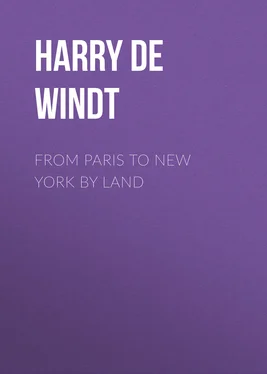Harry De Windt - From Paris to New York by Land
Здесь есть возможность читать онлайн «Harry De Windt - From Paris to New York by Land» — ознакомительный отрывок электронной книги совершенно бесплатно, а после прочтения отрывка купить полную версию. В некоторых случаях можно слушать аудио, скачать через торрент в формате fb2 и присутствует краткое содержание. Жанр: foreign_prose, foreign_antique, на английском языке. Описание произведения, (предисловие) а так же отзывы посетителей доступны на портале библиотеки ЛибКат.
- Название:From Paris to New York by Land
- Автор:
- Жанр:
- Год:неизвестен
- ISBN:нет данных
- Рейтинг книги:4 / 5. Голосов: 1
-
Избранное:Добавить в избранное
- Отзывы:
-
Ваша оценка:
- 80
- 1
- 2
- 3
- 4
- 5
From Paris to New York by Land: краткое содержание, описание и аннотация
Предлагаем к чтению аннотацию, описание, краткое содержание или предисловие (зависит от того, что написал сам автор книги «From Paris to New York by Land»). Если вы не нашли необходимую информацию о книге — напишите в комментариях, мы постараемся отыскать её.
From Paris to New York by Land — читать онлайн ознакомительный отрывок
Ниже представлен текст книги, разбитый по страницам. Система сохранения места последней прочитанной страницы, позволяет с удобством читать онлайн бесплатно книгу «From Paris to New York by Land», без необходимости каждый раз заново искать на чём Вы остановились. Поставьте закладку, и сможете в любой момент перейти на страницу, на которой закончили чтение.
Интервал:
Закладка:
"A New York!" she cried, as our horses sprang into their collars and dashed away down the frosty, silent street.
"N'ayéz pas peur! Nous arriverons," answered de Clinchamp, with a cool assurance which at the time excited my envy, if not admiration!
CHAPTER III
THE GREAT LENA POST-ROAD
The distance from Irkutsk to Yakutsk is about 2000 English miles, but the post-road by which we travelled during the first stage of the overland journey is, properly speaking, no road at all. After leaving Irkutsk the traveller crosses about 150 miles of well-wooded country, until the upper waters of the Lena river are reached. 3 3 The Lena river has an estimated length of not less than 3000 miles. It rises in the Baikal mountains and flows north and east past the towns of Kirensk, Vitimsk, and Olekminsk to Yakutsk, thence it turns to the north-west and enters the Arctic Ocean, forming a wide delta. The Lena receives several large tributaries, viz., the Vitim, about 1400, the Olekma, about 800, and the Aldan, about 1300 miles long.
In winter time the frozen surface of the latter connects the two cities, and there is no other way by land. A double row of pine branches stuck into the snow at short intervals indicate the track, and this is a necessary precaution, as the hot springs of the Upper Lena frequently render the ice treacherous and unsafe. A sharp look-out is, therefore, kept all along the line for overflows, and, when necessary, the road is shifted to avoid them, but notwithstanding these precautions, darkness and drunken drivers often cause fatal accidents. In summer time Yakutsk may be reached by small steamers plying from Ust-kutsk, on the Lena, about 250 miles by road from Irkutsk. The trip takes about a fortnight down stream, and three weeks in the reverse direction, but sand-bars frequently cause delays, rendered the more irksome by poor accommodation, stifling heat, and clouds of mosquitoes. 4 4 This must be very slow travelling, for Dobell, the traveller, writes: "When I descended the Lena from Ust-kutsk in the spring of 1816, I was only fourteen days going to Yakutsk in a large flat-bottomed boat."
Most people in England have a very vague idea of the size of Siberia. It is only by actually visiting the country that one can grasp the harassing difficulties due to appalling distances and primitive modes of locomotion, especially when the traveller is bound for the Far North. I will, therefore, endeavour to convey to the reader, as briefly as possible, the area of this land of illimitable space, and cannot do so better than by quoting the graphic description given by the American explorer, Mr. George Kennan. 5 5 "Siberia and the Exile System," by George Kennan.
He says: "You can take the whole of the United States of America, from Maine to California and from Lake Superior to the Gulf of Mexico, and set it down in the middle of Siberia without touching anywhere the boundaries of the latter's territory; you can then take Alaska and all the countries of Europe, with the exception of Russia, and fit them into the remaining margin like the pieces of a dissected map. After having thus accommodated all of the United States, including Alaska, and the whole of Europe, except Russia, you will still have more than 300,000 miles of Siberian territory to spare. In other words, you will still have unoccupied in Siberia an area half as large again as the Empire of Germany." According to the census of 1897 the entire population of Siberia is little more than that of the English metropolis.
A couple of Yakute sleighs sufficed for ourselves and entire outfit. I rode with de Clinchamp in the leading vehicle, while Harding and the bulk of the stores followed in the other. At first sight, the Yakute sleigh appears to be a clumsy but comfortable contrivance, but very few miles had been covered before I discovered its unlimited powers of inflicting pain. For this machine does not glide like a well-behaved sleigh, but advances by leaps and bounds that strain every nerve and muscle in the body. In anything like deep, soft snow it generally comes to a standstill, and the combined efforts of men and horses are required to set it going again. However, for the first three or four days, good progress was made at the rate of about 200 versts 6 6 A verst is two-thirds of an English mile.
in the twenty-four hours, for we travelled night and day. There was no incentive to pass the night in the post-houses, which were generally of a filthy description, although luxurious compared to the Yakute Yurtas and Tchuktchi huts awaiting us up North. On the Lena post-road, stages were only from fifteen to thirty miles apart, and with a fresh troika (three horses harnessed abreast) at such short intervals, our rate of speed for the first week was very satisfactory. Between Irkutsk and the river Lena part of the road lies through dense forests, which are generally infested with runaway convicts, so we kept a sharp look-out and revolvers handy. Only a week before we passed through this region a mail-cart had been held up and its driver murdered, but I fancy news had filtered through that my expedition was well armed, and we therefore reached the Lena unmolested.
The weather at Irkutsk had been comparatively warm, and we were, therefore, unprepared for the intense cold experienced only forty-eight hours after our departure. Although on the evening of the 19th the thermometer had registered only 10° below zero Fahrenheit, it suddenly sank during the night to 65° below zero, where it remained until the following evening. Oddly enough, a dense mist accompanied the fall of the mercury, rendering the cold infinitely harder to bear. Our drivers declared that this climatic occurrence was most unusual, and the fact remains that this was the lowest temperature recorded during the entire journey south of the Yakute Yurta of Yuk-Takh, several hundred miles north of Yakutsk. There we had to face 75° below zero, but then Yuk-Takh adjoins Verkhoyansk, the coldest place in the world. But the dry frosty air of even this remote settlement inconvenienced me far less than the chilly breeze of a raw November day on the Paris Boulevards with the mercury half a dozen degrees above the freezing-point. On the Lena this Arctic cold only lasted for about eighteen hours, and then slowly rose again, after remaining at about 50° below zero for a couple of days. The severest cold afterwards experienced south of Yakutsk was 51° below zero, and that only upon one occasion. Otherwise it varied from 2° above to 40° below zero, but even that was sufficient to convert our provisions into a granite-like consistency, and at first wearisome delays were occasioned at the post-stations by the thawing out of petrified sardines and tinned soup converted into solid ice. Milk, frozen and cut into cubes, was conveniently carried in a net attached to the sleigh, and this, with tea, was our sole beverage. For a case with a few bottles of Crimean claret, which we had taken to enliven the first portion of the journey, was found when broached to contain nothing but fragments of red ice and broken glass. Even some cognac (for medicinal purposes) was partly frozen in its flask. On the same day de Clinchamp, removing his mits to take a photograph, accidentally touched some metal on the camera, and his fingers were seared as though with a red-hot iron. Perhaps our greatest annoyance on this voyage was the frequent deprivation of tobacco, that heavenly solace on long and trying journeys. For at even 40° below zero nicotine blocks the pipe-stem, and cigar or cigarette freezes firmly to the lips. The moustache also forms a mask of solid ice, and becomes an instrument of torture, so much so that on the third day out on the Lena ours were mercilessly clipped.
The post-houses on this road are, as I have said, luxurious as compared to the accommodation found among the Arctic races of Siberia, but I fancy those accustomed to "roughing it," as the word is generally understood in England, would find even a trip as far as Yakutsk rather a trial. Of course, these establishments vary from the best, which are about on a par with the labourer's cottage in England, to the worst, which can only be described as dens of filth and squalor. All are built on the same plan. There is one guest-room, a bare carpetless apartment, with a rough wooden bench, a table, and two straight-backed wooden chairs, and the room is heated to suffocation by a huge stove, which occupies a corner of the room. The flimsy plank partition is unpapered, but generally plastered with the cheap, crudely coloured prints sold by pedlars. Some of these depicted events connected with our recent war in South Africa, and it is needless to add that the English troops were invariably depicted in the act of ignominious flight. 7 7 I was surprised by the interest displayed by the Russian settlers of this district anent the Boer War. In every village we were eagerly questioned as to how affairs in the Transvaal were progressing.
I purchased one, in which three distinguished British Generals were portrayed upon their knees imploring mercy of Mr. Kruger, and sent it to England, but it never reached its destination. This work of art had been "made in Germany."
Интервал:
Закладка:
Похожие книги на «From Paris to New York by Land»
Представляем Вашему вниманию похожие книги на «From Paris to New York by Land» списком для выбора. Мы отобрали схожую по названию и смыслу литературу в надежде предоставить читателям больше вариантов отыскать новые, интересные, ещё непрочитанные произведения.
Обсуждение, отзывы о книге «From Paris to New York by Land» и просто собственные мнения читателей. Оставьте ваши комментарии, напишите, что Вы думаете о произведении, его смысле или главных героях. Укажите что конкретно понравилось, а что нет, и почему Вы так считаете.












